Agree that training/shaping is a must, and here's how I shaped our GP rescue - walk with dog ON LEASH among the chickens (one at a time in your case). Watch their behavior. If they go toward the chickens in ANY way, correct with tug on the leash and a firm NO (doesn't have to be loud to be firm) . You may need to have a more or less strong tug depending on the dog, but you MUST get their attention with the tug in order to interrupt their mindset (chase the chicken), followed by the NO. Proceed around the yard, correcting as you go. BUT ALSO - when they exhibit the correct behavior (turning away from the chicken, ignoring them when you walk past, not making eye contact with the chicken) you MUST praise/reward them extravagantly with whatever they like (hopefully they don't like chicken !!!). As they exhibit the desired behavior without needing correction let them drag the leash on the ground (so you can grab it if needed). If you have a 6-10 leash or rope you can use that would work well. Be prepared to spend whatever time is needed to get this done. One or two sessions a day per dog is likely enough. I also agree they are too young to be alone with the chickens, and definitely not a good idea for both of them, feeding off too much energy and not enough direction (shaping). Definitely too young to be without their mom if you got them at 8 weeks, but that's water under the bridge now. LGDs strongly tend to mature more slowly, partially due to their size, and also because they acquire their socialization from their parents which includes guarding behaviors. Yes, Maremmas are LGDs and they will have natural protective instincts, but the instincts must be shaped in a way that fits your situation. This is what the parents would do if given the chance. I give credit for much of this information to my friend Robert Denlinger of Kentucky.
Navigation
Install the app
How to install the app on iOS
Follow along with the video below to see how to install our site as a web app on your home screen.
Note: This feature may not be available in some browsers.
More options
You are using an out of date browser. It may not display this or other websites correctly.
You should upgrade or use an alternative browser.
You should upgrade or use an alternative browser.
Our LGDs killed a hen this morning.
- Thread starter allymcshop
- Start date
Gwenish
In the Brooder
- May 27, 2019
- 2
- 9
- 11
I got my Maremma at almost 4 months old. I walked the property line with her 2 times a day. We started on a sort leash, after a bit moved to a long line. All the while I worked with her away from the chickens and goats, on commands like sit, stay, come, leave it and watch me. Once she listened to me. We started walking the land off leash. If she got distracted I'd tell her watch me, if she chased I'd say leave it, come. She is 7 months now and spends most of her time with the animals. But I still work with her daily. She doesnt pay much mind to the chickens anymore and rolls around with the goats. But if an animal she doesn't know comes close she freaks out, but that is her job. Good luck they are puppies and just need trained. Cut up treats and give rewards. I'd start training your dominate dog first. The submissive one will follow its lead and make for easier training
I have never owned a LGD. I think they are magnificent beautiful beasts, but I have heard a lot of stories from fellow farmers who have had them kill the livestock that they were suppose to be protecting. It seems they need a ton of training, I think it would be hard to retrain them once they have gotten a taste and like for chasing and killing chickens. Since yours are puppies, they may still be trainable. Just because they are a LGD breed doesn't mean they will be good at guarding your live stock.
I had a pitbull that was the best farm dog I've ever met. She would lay in the pasture with the hens and the sheep and never once bothered any livestock. If a large bird flew over, she would run the fence line and bark at it until it went away. She made coyotes wary. I got her as a rescue when she was about 1 year. I gave her zero training she just instinctively knew the difference between a farm animal and predator. She was probably able to pick up how we interacted with farm the animals and clapped and yelled at hawks/eagles.
I had a pitbull that was the best farm dog I've ever met. She would lay in the pasture with the hens and the sheep and never once bothered any livestock. If a large bird flew over, she would run the fence line and bark at it until it went away. She made coyotes wary. I got her as a rescue when she was about 1 year. I gave her zero training she just instinctively knew the difference between a farm animal and predator. She was probably able to pick up how we interacted with farm the animals and clapped and yelled at hawks/eagles.
I have never owned a LGD. I think they are magnificent beautiful beasts, but I have heard a lot of stories from fellow farmers who have had them kill the livestock that they were suppose to be protecting. It seems they need a ton of training, I think it would be hard to retrain them once they have gotten a taste and like for chasing and killing chickens. Since yours are puppies, they may still be trainable. Just because they are a LGD breed doesn't mean they will be good at guarding your live stock.
I had a pitbull that was the best farm dog I've ever met. She would lay in the pasture with the hens and the sheep and never once bothered any livestock. If a large bird flew over, she would run the fence line and bark at it until it went away. She made coyotes wary. I got her as a rescue when she was about 1 year. I gave her zero training she just instinctively knew the difference between a farm animal and predator. She was probably able to pick up how we interacted with farm the animals and clapped and yelled at hawks/eagles.
I had a pitbull that was the best farm dog I've ever met. She would lay in the pasture with the hens and the sheep and never once bothered any livestock. If a large bird flew over, she would run the fence line and bark at it until it went away. She made coyotes wary. I got her as a rescue when she was about 1 year. I gave her zero training she just instinctively knew the difference between a farm animal and predator. She was probably able to pick up how we interacted with farm the animals and clapped and yelled at hawks/eagles.
Agree that training/shaping is a must, and here's how I shaped our GP rescue - walk with dog ON LEASH among the chickens (one at a time in your case). Watch their behavior. If they go toward the chickens in ANY way, correct with tug on the leash and a firm NO (doesn't have to be loud to be firm) . You may need to have a more or less strong tug depending on the dog, but you MUST get their attention with the tug in order to interrupt their mindset (chase the chicken), followed by the NO. Proceed around the yard, correcting as you go. BUT ALSO - when they exhibit the correct behavior (turning away from the chicken, ignoring them when you walk past, not making eye contact with the chicken) you MUST praise/reward them extravagantly with whatever they like (hopefully they don't like chicken !!!). As they exhibit the desired behavior without needing correction let them drag the leash on the ground (so you can grab it if needed). If you have a 6-10 leash or rope you can use that would work well. Be prepared to spend whatever time is needed to get this done. One or two sessions a day per dog is likely enough. I also agree they are too young to be alone with the chickens, and definitely not a good idea for both of them, feeding off too much energy and not enough direction (shaping). Definitely too young to be without their mom if you got them at 8 weeks, but that's water under the bridge now. LGDs strongly tend to mature more slowly, partially due to their size, and also because they acquire their socialization from their parents which includes guarding behaviors. Yes, Maremmas are LGDs and they will have natural protective instincts, but the instincts must be shaped in a way that fits your situation. This is what the parents would do if given the chance. I give credit for much of this information to my friend Robert Denlinger of Kentucky.
I like this, but I would use the voice first (say No or Leave It) and then tug the leash; and I very much agree that there should also be PRAISE (reinforcement) for desired behavior, i.e., ignoring the chickens. I call this method "Red Light, Green Light." The dog must not only learn what not to do, but more importantly, he must learn the preferred behavior. Catch him doing it right! And positive reinforcement does not have to be a treat or something that goes in his mouth. Give him a little pat on the head and a "Good boy!", watch his tail wag. Smile and make eye contact as you praise him. Trot with him a few steps. Dogs love all these things, they make him feel good and happy all over and help build the bond between you. These things are "Dogspeak."
Wow - so many things are going through my head: I can share some experiences as a newbie Maremma mom with two puppies and I also still have a tons of questions.
Everyone brings something else to the table - I would say: don't be discouraged or too scared, you can do this! Just take a deep breath and think about what will work for you. I almost gave one of my puppies back to the breeder and almost hired a dog-trainer (all of them wanted not hundreds but thousands of dollars) but then my very nice vet stepped in and told me that I did not need to lose one of my dogs and he put me in touch with a retired trainer who put my mind at ease about what the dogs were doing and what I could do in a simple phone call at no charge.
My pups did not act like they were attached at the hip - the opposite - they developed nasty guarding behaviors over food, anything they considered theirs (stick they found in the yard), and even a place to sit even though they had 4 acres to chose from. They fought each other like mortal enemies all of a sudden. We got through it.
We also got them early, at 8 weeks about, and I had done so much reading and even called a Maremma guru who had written articles that everyone was copying - brought Guinea feathers and "stink" to the breeder and included it in the puppy nest with the mother to get them used to the smell of our birds. Ha! They don't give a fart about the birds.
Like you, I thought they would naturally protect them and left them together after very careful supervision for several months, I have to say. My birds are very dear to me, every one, and when I read "to expect losses" at first with the dogs - yes, they say that!, so don't worry too much about your dogs not being normal or things not working out later, I think - anyway, I was not going to settle for any "losses" and I was like stink on s#$% with them for the first 12 months when they were around the birds - first on a harness and leash and then under sharp voice commands if they even so much as thought about chasing a bird. I don't even let them interfere when the birds fight - and with Guineas that involves a spectacular chase! They got it.
What they did not get was to protect them. So one day I came home from a short trip during which I trusted them to keep an eye on the predators and Roy was gone. Feathers right by the coop. Dogs under the house, staying out of the sun/heat, not caring a fart if the fox has a meal out there in the yard. #$%&$^&!!!!
What a disappointment!
I still can't rely on these dogs to give me a break or let the birds out all day when I would so desperately like to: they will disappear under the house. What made it much much worse was that I used to use a scare gun to chase away hawks when the Guineas were screeching - and the dogs absolutely hate the gun noise - they are scared to death of it. So, they learned to run for cover when the birds call an alarm. Great! Not. The opposite!
The way it works now is that they know I get mad if they run under the house, so they run to me when there is screeching. I avoid using that gun now. I have to be out when the birds are out (which limits their time out terribly and is stressful for the birds since they are locked up so much - I got an expensive property fence and the dogs to avoid this and let them out from dawn to dusk!! that was the plan...) Anyway, the dogs will go out into the field when I do and I can ask them to sit and stay there, which at least enables me to do some yard work while they are watching the edge of the woods with the birds in between us. It is not ideal. They will not guard the birds and even creep up to the house if I don't watch and correct them and make them go back to the edge of the woods and sit there.
It is really too bad.
I am grateful that I had no bird attacked by our pups, but they sure as s#$% don't care to guard them either.
They help by being there. Peeing and pooing and barking and watching with me, if I am out there and make them. But I had hoped for so much more myself.
I guess what I am saying is that I think one has to play it by ear and adjust and try to improve things every day. Common sense goes a long way. And I am open to suggestions on how I could make these two into the dream protectors I could trust to defend the flock when I am not there. =]
Our pups are 3 years old now. Spayed and neutered.
Some pics below to show you how we started getting everyone used to each other without incident. Pen > leash > supervision with voice (if needed) > alone with birds ok (older by that time, probably 12 months at least). And some from today.
This resource is free and may help some, even though it is mostly about commercial use for the dogs. It does have sections on bonding pups to livestock and two examples of chicken farms. It also has a section on problem solving in case of livestock harassment by the dogs. It may at least give some ideas. I think since your dogs are still puppies and they did not eat the bird completely, they can most likely still be trained to protect the birds or at least not harm them, and you could probably consider the killing(s) as accidents to be prevented from now on.
https://webs.dogs.net.au/askdc/uploads/documents/Livestock_Guardian_Dog_Manual.pdf
Everyone brings something else to the table - I would say: don't be discouraged or too scared, you can do this! Just take a deep breath and think about what will work for you. I almost gave one of my puppies back to the breeder and almost hired a dog-trainer (all of them wanted not hundreds but thousands of dollars) but then my very nice vet stepped in and told me that I did not need to lose one of my dogs and he put me in touch with a retired trainer who put my mind at ease about what the dogs were doing and what I could do in a simple phone call at no charge.
My pups did not act like they were attached at the hip - the opposite - they developed nasty guarding behaviors over food, anything they considered theirs (stick they found in the yard), and even a place to sit even though they had 4 acres to chose from. They fought each other like mortal enemies all of a sudden. We got through it.
We also got them early, at 8 weeks about, and I had done so much reading and even called a Maremma guru who had written articles that everyone was copying - brought Guinea feathers and "stink" to the breeder and included it in the puppy nest with the mother to get them used to the smell of our birds. Ha! They don't give a fart about the birds.
Like you, I thought they would naturally protect them and left them together after very careful supervision for several months, I have to say. My birds are very dear to me, every one, and when I read "to expect losses" at first with the dogs - yes, they say that!, so don't worry too much about your dogs not being normal or things not working out later, I think - anyway, I was not going to settle for any "losses" and I was like stink on s#$% with them for the first 12 months when they were around the birds - first on a harness and leash and then under sharp voice commands if they even so much as thought about chasing a bird. I don't even let them interfere when the birds fight - and with Guineas that involves a spectacular chase! They got it.
What they did not get was to protect them. So one day I came home from a short trip during which I trusted them to keep an eye on the predators and Roy was gone. Feathers right by the coop. Dogs under the house, staying out of the sun/heat, not caring a fart if the fox has a meal out there in the yard. #$%&$^&!!!!
What a disappointment!
I still can't rely on these dogs to give me a break or let the birds out all day when I would so desperately like to: they will disappear under the house. What made it much much worse was that I used to use a scare gun to chase away hawks when the Guineas were screeching - and the dogs absolutely hate the gun noise - they are scared to death of it. So, they learned to run for cover when the birds call an alarm. Great! Not. The opposite!
The way it works now is that they know I get mad if they run under the house, so they run to me when there is screeching. I avoid using that gun now. I have to be out when the birds are out (which limits their time out terribly and is stressful for the birds since they are locked up so much - I got an expensive property fence and the dogs to avoid this and let them out from dawn to dusk!! that was the plan...) Anyway, the dogs will go out into the field when I do and I can ask them to sit and stay there, which at least enables me to do some yard work while they are watching the edge of the woods with the birds in between us. It is not ideal. They will not guard the birds and even creep up to the house if I don't watch and correct them and make them go back to the edge of the woods and sit there.
It is really too bad.
I am grateful that I had no bird attacked by our pups, but they sure as s#$% don't care to guard them either.
They help by being there. Peeing and pooing and barking and watching with me, if I am out there and make them. But I had hoped for so much more myself.
I guess what I am saying is that I think one has to play it by ear and adjust and try to improve things every day. Common sense goes a long way. And I am open to suggestions on how I could make these two into the dream protectors I could trust to defend the flock when I am not there. =]
Our pups are 3 years old now. Spayed and neutered.
Some pics below to show you how we started getting everyone used to each other without incident. Pen > leash > supervision with voice (if needed) > alone with birds ok (older by that time, probably 12 months at least). And some from today.
This resource is free and may help some, even though it is mostly about commercial use for the dogs. It does have sections on bonding pups to livestock and two examples of chicken farms. It also has a section on problem solving in case of livestock harassment by the dogs. It may at least give some ideas. I think since your dogs are still puppies and they did not eat the bird completely, they can most likely still be trained to protect the birds or at least not harm them, and you could probably consider the killing(s) as accidents to be prevented from now on.
https://webs.dogs.net.au/askdc/uploads/documents/Livestock_Guardian_Dog_Manual.pdf
Attachments
-
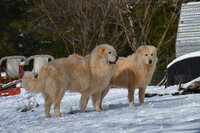 dogs.jpg447.1 KB · Views: 13
dogs.jpg447.1 KB · Views: 13 -
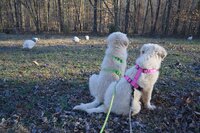 We are Guinea Guarding (in training).jpg773.6 KB · Views: 15
We are Guinea Guarding (in training).jpg773.6 KB · Views: 15 -
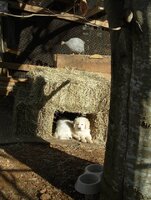 Next Day Accommodations_ Being Checked Out By Guinea Fowl.jpg282.6 KB · Views: 16
Next Day Accommodations_ Being Checked Out By Guinea Fowl.jpg282.6 KB · Views: 16 -
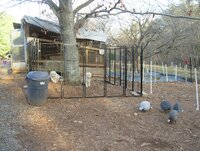 Future Guardians.jpg319 KB · Views: 13
Future Guardians.jpg319 KB · Views: 13 -
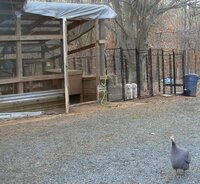 First Encounter.jpg186.6 KB · Views: 13
First Encounter.jpg186.6 KB · Views: 13 -
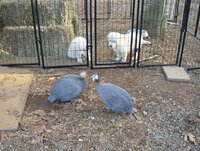 Learning.jpg369.7 KB · Views: 14
Learning.jpg369.7 KB · Views: 14 -
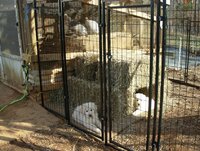 Curious Guinea Fowl.jpg345.3 KB · Views: 12
Curious Guinea Fowl.jpg345.3 KB · Views: 12 -
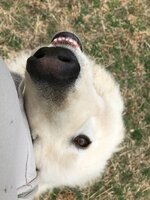 Watching mom_not birds.jpg455.9 KB · Views: 10
Watching mom_not birds.jpg455.9 KB · Views: 10 -
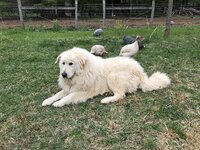 OK with birds.jpg1 MB · Views: 12
OK with birds.jpg1 MB · Views: 12 -
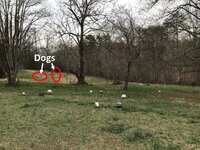 Guarding sort of.jpg416.7 KB · Views: 11
Guarding sort of.jpg416.7 KB · Views: 11
Last edited:
I’m so sorry to hear that your pups have been killing your hens! How upsetting. Although I have never raised a Maremma, I grew up with Pyrs and currently have a high prey drive GSD who protects the yard and her chickens. Most guardian breeds tend to be on the stubborn/ independent side since they moved with the flock & were dependent on themselves for making judgment calls, away from humans and their commands. But not all hope is lost! With proper boundaries and training, they are really amazing dogs, capable of heroically protecting “their” flock.
With any dog- stop, leave it, and come are the holy trinity of commands. There are great training videos on YouTube that will show you how to accomplish these commands if you need assistance. As others have stated, if this is your first dog, I would look into professional training- there are lots of places that have group classes that will also offer additional socialization and discuss dogs mental growth phases (which are super important to understand, especially when training for guardianship).
I hope this situation improves for your family, hens, & pups ❤
With any dog- stop, leave it, and come are the holy trinity of commands. There are great training videos on YouTube that will show you how to accomplish these commands if you need assistance. As others have stated, if this is your first dog, I would look into professional training- there are lots of places that have group classes that will also offer additional socialization and discuss dogs mental growth phases (which are super important to understand, especially when training for guardianship).
I hope this situation improves for your family, hens, & pups ❤
Gray Angel Farm
Songster
I had 2 litter mates that were mixed breeds. A brother and sister, lab, border collie with a pinch of heeler in them. One favored the look/personality of a border collie and the male acts more like a lab. Over 4 yrs we guess they probably killed approx 80 chickens. Most times there was no mauling at all. I think they would scare them and chase them and their hearts couldn’t take it. We often would find 6-8 in a corner in the coop all huddled up together and dead. But by the spreading of feathers we knew the dogs had been after them.
We didn’t intentionally let them out to cause harm. We finally made the decision to get rid of the sister. We felt like she was the leader. Her brother hasn’t killed a chicken since she left. We have a new puppy, well she’s 8 months old and all I can say is yes yes yes....training and more training and when you think your done...just keep training. If not corrected immediately you’ll end up where we were with our 2 litter mates.
Tons of training videos on you tube and endless internet sources for training info and advice. Training is like raising a kid, patience and consistency go a long way!!!
We didn’t intentionally let them out to cause harm. We finally made the decision to get rid of the sister. We felt like she was the leader. Her brother hasn’t killed a chicken since she left. We have a new puppy, well she’s 8 months old and all I can say is yes yes yes....training and more training and when you think your done...just keep training. If not corrected immediately you’ll end up where we were with our 2 litter mates.
Tons of training videos on you tube and endless internet sources for training info and advice. Training is like raising a kid, patience and consistency go a long way!!!
Last edited:
cuddleclucker
In the Brooder
[/QUOTE]
It's a mistake to have more than one livestock guardian dog protecting your chickens. When you have two or more dogs together it triggers a pack instinct in the dogs in which they will want to kill and will kill the chickens, so only have one dog with your flock.
It's a mistake to have more than one livestock guardian dog protecting your chickens. When you have two or more dogs together it triggers a pack instinct in the dogs in which they will want to kill and will kill the chickens, so only have one dog with your flock.
Until at least a year and a half, such puppies really need watching! I have put drags on older puppies to stop chasing, a phase. Those pups might be fitted with small dangle sticks.
New posts New threads Active threads
-
Latest threads
-
-
Hen lethargic, loosing feathers, and not moving much
- Started by chickenlover78
- Replies: 0
-
-
-
-
-
Threads with more replies in the last 15 days
-
-
-
-
-
Prettiest chicken breeds and plumage color
- Started by Beau plus penny
- Replies: 46
-
×


